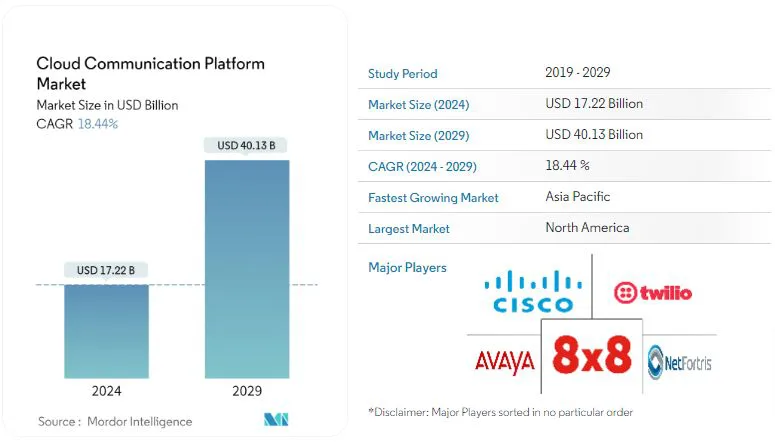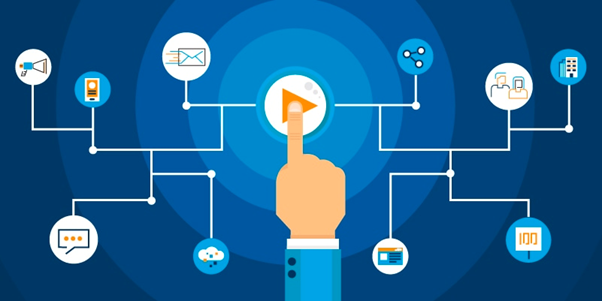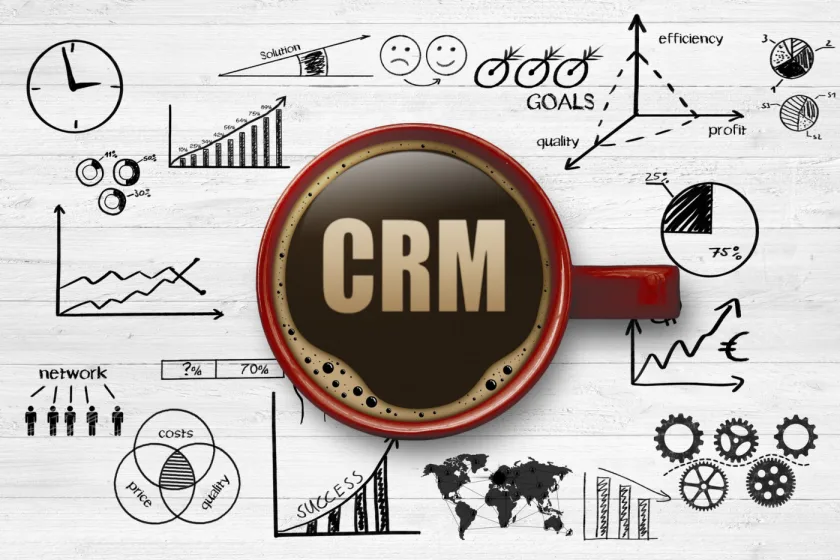
The trajectory of cloud-based messaging platforms is on an upward trend. As industries globally adopt advanced technologies, the demand for sophisticated applications is also increasing. As per Market Research Future, the Cloud Communication Platform market industry is projected to grow from USD 19.38 Billion in 2024 to USD 82.21 Billion by 2032, exhibiting a compound annual growth rate (CAGR) of 19.80% during the forecast period (2024 – 2032). While Mordor Intelligence estimates it to reach USD 40.13 billion by 2029, growing at a CAGR of 18.44% during the forecast period (2024-2029).

Some of the key technologies enhancing the functionality and adoption of these platforms include:
- Artificial Intelligence (AI) and Machine Learning (ML): With the help of Natural Language Processing (NLP) and advanced AI techniques, chatbots are empowered to automatically respond to customer queries in a more personalized and accurate manner. The scripts are predefined and, acquire responses from past interactions. ML algorithms analyse large sets of customer data which then becomes the history. And later tailored messages are made and presented to the demographics.
- One example is, a potential customer, lands on an online clothing store and types, “Do you have an orange shirt available in size M?”
- The AI chatbot analyses past queries and finds that many customers with similar profiles frequently ask about specific sizes. It checks the inventory, sees that size M in orange is available, and responds with, “Yes, we have the orange shirt in size M available! Would you like me to help you add it to your cart?”
- Natural Language Processing (NLP): It is a branch of AI that enables computers to comprehend, interpret, and respond to human language in a way that is both meaningful and useful. The NLP algorithms can parse and analyse text to identify the intent behind a customer’s query. Understating the “intent” is crucial as it helps the system to provide specific information rather than irrelevant details.
- Imagine a customer messaging a support platform with the query, “I need a refund”. If the system understands that the intent is related to a product return, it can immediately provide the refund process steps, rather than offering general customer service information. This targeted response not only improves efficiency but also enhances the user’s experience by addressing their specific concern.
- 5G Connectivity: As 5G enables faster and more reliable messaging, it exponentially reduces latency, the time it takes for data to travel between devices. This allows for real-time engagement especially in mobile-first regions.
- For instance, a real estate company (based on a cloud-based messaging platform) can share AR-based property tours with potential buyers. 5G connectivity allows these high-quality virtual tours to be rendered effortlessly and in real time. Buyers can interactively explore properties without any lag or interruption, enabling them to make quicker decisions. Consequently, this increases engagement with the listings.
- Internet of Things (IoT): IoT devices allow for real time status, performance and updates from connected devices. A messaging platform integrated with these devices can relay this information to users in real time, such as updates on energy consumption, equipment status, or environmental conditions.
- For instance, if a smart refrigerator reports that its temperature is rising, the messaging platform can send an update to the user to check the appliance and prevent potential spoilage.
- Blockchain Technology: It is a technique for storing and sharing information securely. Quite like a digital ledger, the information is spread across many computers instead of being kept in one central place. Each piece of information, or “block”, is linked to the one before it, forming a “chain”. Data is encrypted and linked to previous blocks through a cryptographic hash, creating a secure chain of records. This makes unauthorized access or alterations virtually impossible.
- Transactions on the blockchain are validated through consensus mechanisms (e.g., Proof of Work, Proof of Stake) that require agreement among network participants. This collective validation process enhances data security and prevents fraudulent transactions.
- It’s like, you and your friends want to keep track of who borrows books from your shared collection. Instead of a single person keeping a list, everyone has their own copy of the list that gets updated every time someone borrows or returns a book. When someone borrows a book, everyone writes down the details at the same time, and if there’s ever a disagreement, you can all check your copies to see what was recorded. This way, no one person controls the list, and everyone has a perfect record of all transactions.
- Cloud Computing: It lets messaging services manage a lot of messages without any hassle. Businesses only pay for what they actually use, which saves money. All it requires is an internet connection. Additionally, cloud services are generally reliable and have features to back up data and recover it if something goes wrong, which also means, the service stays up and running most of the time.
- WhatsApp, for instance, uses cloud computing. Instead of managing all the servers themselves, they use cloud services to store messages, images, and videos, and to scale their system based on user demand. Billions of messages are exchanged daily and users hardly worry about running out of space or the service going down. They also benefit from cloud backup and recovery features, which help protect user data and keep the app reliable, even during technical issues or outages.
- Process Automation and Workflow Management: These are the systems which take care of repeatable jobs without needing people to do them. One person is enough than a large force to take care of automatic processes, like marketing emails, follow up with customers, and remind people about appointments. This means businesses don’t have to spend time and energy on these tasks, allowing employees to focus on other important work.
- For example, a coffee shop can use automation to send customers an email reminder about their coffee orders every Saturday morning. Additionally, it can send a special discount for their next purchase, without any staff needing to send those emails manually.

Top Cloud-Based Messaging Platforms: Features, Integrations, and What Sets Them Apart
Having said that, market trends show that the rapid adoption of cloud-based messaging platforms is transforming how businesses communicate and engage with customers. Considering the cutting-edge technologies such as AI, ML, NLP, 5G, IoT, and blockchain, these platforms offer unparalleled efficiency, scalability, and security.
They enable more personalized and seamless experiences for customers, which in turn empowers businesses while also reducing costs and operational complexities. Cloud-based messaging platforms are poised to play an even more critical role in the digital landscape. Here are some of the most sought-after players in the market:
1) SMS-Magic
SMS-Magic is a global messaging platform that integrates with popular CRM systems like Salesforce AppExchange and Zoho Marketplace. The system supports small, mid-market, and enterprise clients worldwide. It offers seamless syncing of customer data and messaging capabilities directly within these CRM platforms.
Key Features:
- Two-Way Messaging: Allows for real-time, two-way conversations within the CRM.
- Automated Responses: Supports automated message flows based on CRM triggers.
- Analytics and Reporting: Provides detailed insights and reports on messaging performance and customer engagement.
Difference: Focuses heavily on integration with specific CRM systems (Salesforce and Zoho) and offers robust analytics features. Primarily focused on SMS and two-way messaging within these CRM systems.
2) Podium
Podium is a platform aimed towards streamlining lead conversion and customer engagement. It integrates with popular CRM systems to provide a unified solution for attracting leads, speeding up conversions, and fostering customer loyalty.
The system support businesses by consolidating review management, phone systems, lead tracking, website chat, payment processing, and text marketing into a single, user-friendly platform.
Key Features:
- Multi-Channel Messaging: Supports SMS, email, and online reviews, providing a unified communication platform.
- Customer Feedback and Reviews: Collects and manages customer feedback and reviews directly through the platform.
- Automated Responses: Enables automated messaging to streamline customer interactions.
Difference: Emphasizes multi-channel communication and review management, offering a broader range of interaction types beyond SMS.
3) SimpleTexting
SimpleTexting offers integration with various CRM systems and business tools, though it might not be as deeply integrated as some other platforms.
Key Features:
- Mass Texting: Allows for bulk SMS messaging to large lists, ideal for marketing campaigns.
- Automated Workflows: Includes features for setting up automated text responses and scheduling messages.
- Analytics: Provides reporting and analytics to track message performance and engagement.
Difference: Known for its ease of use and mass texting capabilities, but might lack the deep CRM integrations found in other platforms.
4) Brevo
Brevo integrates with various CRM systems and marketing tools, offering seamless data synchronization for unified customer engagement.
Key Features:
- Multi-Channel Marketing: Supports SMS, email, and other marketing channels for a comprehensive approach.
- Campaign Management: Includes tools for designing, executing, and analyzing marketing campaigns.
- Automation: Features automated workflows for marketing and customer engagement.
Difference: Focuses on multi-channel marketing and comprehensive campaign management, making it suitable for businesses needing broader marketing capabilities.
5) Text Request
Text Request integrates with various CRM systems to enable SMS and MMS communication directly from the CRM platform.
Key Features:
- Two-Way Messaging: Enables real-time communication through SMS and MMS.
- Team Collaboration: Allows multiple team members to manage and respond to messages collaboratively.
- Automated Workflows: Includes automation for message scheduling and responses.
Difference: Strong in team collaboration and real-time communication, setting it apart from platforms that focus more on individual or automated messaging.
6) Mogli
Mogli specializes in SMS and messaging solutions for Salesforce, providing deep integration with Salesforce CRM for seamless data and communication management.
Key Features:
- Salesforce Integration: Directly integrates with Salesforce, allowing for SMS communication within the Salesforce ecosystem.
- Automated Messaging: Supports automated text messages based on Salesforce triggers.
- Analytics and Reporting: Provides insights into messaging performance within Salesforce.
Difference: Tailored specifically for Salesforce users, offering deep integration and customization within Salesforce, which might not be as flexible for non-Salesforce users.
7) 360 SMS
360 SMS is designed specifically for Salesforce users, offering comprehensive SMS and MMS capabilities within the Salesforce environment.
Key Features:
- Salesforce Integration: Provides deep integration with Salesforce, allowing for SMS communication and management within the CRM.
- Automated Messaging: Features automated SMS workflows and campaign management.
- Detailed Reporting: Includes robust reporting tools for analyzing messaging performance.
Difference: Focused on Salesforce with robust SMS functionalities and detailed reporting, making it similar to Mogli but with different user experiences and pricing considerations.
8) Twilio
Twilio allows seamless integration with a wide range of CRM systems, including Salesforce, HubSpot, and Zoho. Its flexible API allows businesses to customize their CRM interactions extensively.
Key Features:
- Omnichannel Communication: Supports SMS, voice, email, and chat, providing a comprehensive communication solution.
- Advanced API: Allows for deep customization and integration with CRM systems to automate and manage customer interactions.
- Analytics and Reporting: Provides detailed insights into communication performance and customer engagement.
Difference: Known for its extensive API capabilities and omnichannel support, Twilio is highly customizable but may be more complex to configure compared to simpler platforms.
9) EZ Texting
EZ Texting integrates with CRM systems, including Salesforce and HubSpot. It provides a user-friendly interface for managing text messaging within these systems.
Key Features:
- Mass Texting: Allows for sending bulk SMS messages, ideal for marketing and notifications.
- Automated Responses: Includes features for automated replies and scheduling.
- CRM Sync: Integrates customer data from CRMs for targeted messaging.
Difference: Focuses on ease of use and mass texting, with straightforward CRM integrations. It may not offer the same level of customization or advanced features as other platforms.
10) Bird
Bird offers integration with various CRM systems and business tools, allowing for seamless communication across platforms.
Key Features:
- Global Messaging: Supports SMS, voice, and chat across multiple channels and countries.
- Omnichannel Platform: Provides a unified solution for managing different communication channels.
- API and Dashboard: Offers an API for integration and a user-friendly dashboard for managing interactions.
Difference: Known for its global reach and omnichannel capabilities, Bird stands out with its extensive international coverage and multi-channel support.
11) Textedly
Textedly integrates with various CRM systems, providing an easy way to manage SMS campaigns and customer data.
Key Features:
- SMS Campaigns: Features bulk messaging and campaign management.
- Automated Texting: Includes automated response and scheduling tools.
- CRM Sync: Syncs with CRM systems for targeted and personalized messaging.
Difference: Offers a straightforward approach to SMS marketing with easy integration and user-friendly features, but may lack the advanced capabilities and customization of platforms like Twilio.
12) ClickSend
ClickSend integrates with a variety of CRM systems and offers API access for seamless communication and data synchronization.
Key Features:
- Multi-Channel Messaging: Supports SMS, email, voice, and direct mail.
- Automation: Includes automated messaging workflows and scheduling.
- Reporting and Analytics: Provides detailed insights and reports on messaging performance.
Difference: Known for its multi-channel approach and extensive feature set. The system offers a broad range of communication options, setting it apart from SMS-focused platforms.
13) SlickText
SlickText integrates with several CRM systems, offering an easy way to manage SMS campaigns and sync customer data.
Key Features:
- SMS Marketing: Provides tools for SMS marketing, including mass texting and keyword campaigns.
- Automation: Features automated messaging and response workflows.
- Analytics: Includes reporting and analytics to track campaign performance.
Difference: Focuses on SMS marketing with an emphasis on simplicity and ease of use. It may not offer the multi-channel or advanced integration features available in more comprehensive platforms.

Summary of Major Differences
Each platform has its own strengths and is tailored to different requirements.
- Integration Depth: SMS-Magic, Mogli, and 360 SMS excel in Salesforce integration, while Podium and Brevo offer broader multi-channel solutions. SMS-Magic’s automation capabilities simplify repetitive tasks and ensure consistent customer engagement, allowing businesses to focus on strategic initiatives. Additionally, the platform’s detailed analytics and reporting tools offer valuable insights into messaging performance.
- Communication Channels: Twilio and Bird provide extensive multi-channel communication options, including SMS, voice, email, and chat.
- Ease of Use: Platforms like SMS-Magic, SimpleTexting, Textedly, and SlickText are known for their user-friendly interfaces and simplicity in SMS marketing.
- Specialization: Podium and Brevo are more comprehensive marketing and customer engagement platforms, while ClickSend and Text Request offer multi-channel and team collaboration features, respectively.
What are the Benefits and ROI of Enhanced CRM Capabilities?
Enhanced CRM systems take customer interactions to the next level by tracking preferences and history, making each interaction more personalized. This personal touch not only boosts customer satisfaction but also builds loyalty, which is key to long-term success. Plus, with automated workflows and reminders, your sales and marketing strategies get a serious upgrade.
Managing and tracking loyalty programs and rewards becomes an effortless task. Thus, it’ll assist in nurturing long-term relationships and encourage repeat business.
And it doesn’t stop there—better customer insights open the door to effective cross-selling and upselling. This means you can boost your average revenue per customer and keep growing your business.
In a nutshell, better CRM capabilities make an exponential difference for your business. Not only stronger customer base but it’ll also make your sales and marketing efforts more effective. Plus, with improved analytics, you get valuable insights that really pay off. All these benefits add up to a significant ROI, including more revenue, cost savings, greater customer lifetime value, and happier, more productive employees.

Takeaway
Over all, the landscape of cloud-based messaging platforms is evolving at a fast pace. The ever-growing market demand fuelled by significant technological advancements is propelling businesses to look for more sophisticated communication tools for enhancing customer engagement and streamline operations.
The substantial growth that the market is projecting reflects the increasing reliance on these platforms. Key players like SMS-Magic, Podium, SimpleTexting, Brevo Marketing Platform, and others each bring unique strengths to the table. From deep CRM integrations to multi-channel communication capabilities, there’s a platform that aligns with nearly everyone’s business needs.
So, if you want to stay ahead in this competitive digital landscape and achieve significant returns on investment, it is essential to invest in advanced cloud-based messaging platforms that integrate seamlessly with your CRM systems.



